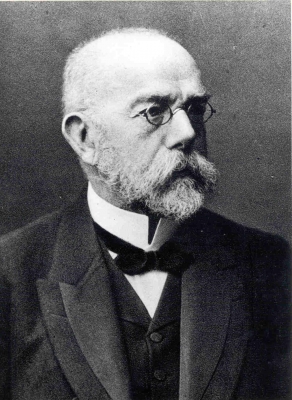
Dr Robert Koch was a pivotal figure in the golden age of microbiology. It was the German bacteriologist who discovered the bacteria that causes anthrax, septicaemia, tuberculosis and cholera, and his methods enabled others to identify many more important pathogens. Thanks to his contributions to the field, he is sometimes known as the father of bacteriology, a title shared with Louis Pasteur.
Koch’s first important discovery was on anthrax, a disease that killed large numbers of livestock and some humans. Rod-shaped structures had been observed in the blood of infected animals, but the cause of the disease was still uncertain.
Koch found that the disease could be spread by the blood of infected animals, and hypothesised that it was caused by living bacteria. He developed sophisticated techniques for observing bacterial growth on microscope slides, and saw that anthrax could form spores that survived desiccation, but produced more bacteria when put back into a moist environment. This explained how contaminated soil could remain toxic for years.
Although others had earlier determined that germs cause disease – notably Pasteur and Joseph Lister – Koch was the first to link a specific bacterium, in this case bacillus anthracis, to a specific disease.
Koch learned that dyes helped to make bacteria visible and identifiable under the microscope, and published the first photographs of bacteria. He proudly announced to his parents he had taught himself to read at the age of five with the aid of the newspapers the adults read and then discarded. He even has a crater on the moon named after him. He was awarded the Nobel Prize in Medicine in 1905 for his tuberculosis findings and is considered one of the founders of microbiology.
Credit : Stanford
Picture Credit : Google




